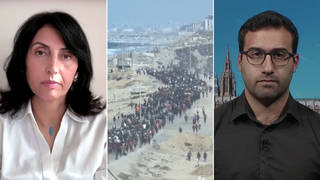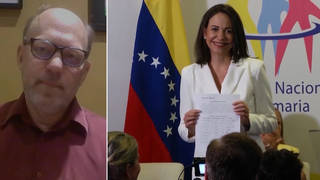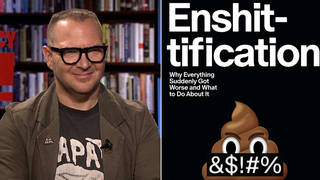
On Valentines Day–one of the busiest days for sale of roses and chocolate–Global Exchange is working to raise awareness about the state of the world’s cocoa producers which are home to widespread child labor and even child slavery. [Includes transcript]
Well Saturday is Valentines Day–one of the busiest days for sale of roses and chocolate.
This year Global Exchange is working to raise awareness about part of the dark side of Valentines Day–the state of the world’s cocoa producers who make chocolate.
According to Global Exchange cocoa farms are home to widespread child labor and even child slavery especially in West Africa. Global Exchange is calling on the world’s biggest chocolate company M&M/Mars to start selling fair trade certified chocolate.
- Melissa Schweisguth, Global Exchange Fair Trade coordinator
Transcript
AMY GOODMAN: We are joined to end our show with Melissa Schweisguth, who is the fair trade coordinator for Global Exchange. Welcome Melissa.
MELISSA SCHWEISGUTH: Good morning.
AMY GOODMAN: Well I’ll say happy Valentine’s Day, but I don’t expect that you will celebrate with chocolates in particular?
MELISSA SCHWEISGUTH: That’s right, but there are lots of fair trade to celebrate with.
AMY GOODMAN: Can you talk about where chocolate comes from?
MELISSA SCHWEISGUTH: Well, chocolate is made of coco, as you probably know, and about 70% of the world’s cocoa comes from West Africa, with 42% coming from the Ivory Coast alone. So West Africa is clearly the major source, particularly for the largest companies such as M&M/Mars.
AMY GOODMAN: We only have a minute, but you can explain what the problem is?
MELISSA SCHWEISGUTH: The basic problem is that a few years ago, child slavery and child labor were discovered on cocoa farms, and the industry initially denied all responsibility for this problem, but after some pressure they developed a “plan.” But their plan does not involve any kind of minimum pricing or living wage for the producers. The reason that produce remembers using this widespread child labor and slavery is because they’re so poor. What they need is a stable minimum wage, to allow them to send their kids to school and pay workers. The industry refuses to do this, because they really are concerned about maximum profits.
JUAN GONZALEZ: M&M/Mars, that’s a U.S.-based company, right?
MELISSA SCHWEISGUTH: They are U.S.-based, but they are the largest internationally, so they are worldwide.
JUAN GONZALEZ: Could you tell us the major companies that may be involved in the same practices?
MELISSA SCHWEISGUTH: The major companies are members of the Chocolate Manufacturers’ Association, such as Hershey’s Food and Nestle Worldwide, those kinds of companies.
AMY GOODMAN: What has been M& M/Mars response?
MELISSA SCHWEISGUTH: Well, M&M/Mars has declared total faith in the industry protocol, and their limited charity development projects. They have expressed no interest in fair trade. This comes despite the fact that thousands of children across the country have written on Valentine’s Day, and even mailed back candy this past Halloween. Over 4,500 adults have faxed them to the website. They even have ignored the demands of producers asking for fair trade.
AMY GOODMAN: We only have a minute, but I understand that you are in Washington today to lobby around the issue of chocolate. Where can people go to get fair trade chocolate?
MELISSA SCHWEISGUTH: The best place to go is global exchange.org/cocoa. You click on where to buy and you can find a list of fair trade companies. Those companies are all 100% fair trade, which means everything that they sell is fair trade. They are a clear sign that this is a viable business model, you don’t need to sacrifice profits to support farmers. And they are all delicious products, I have tried them all.
AMY GOODMAN: And your journey to Capitol Hill., what will you be asking for?
MELISSA SCHWEISGUTH: First, we are going to meet a few Senators, and ask them to help us lobby M&M/Mars to be better corporate citizens, and also to enforce existing custom laws that bar the importation of products made from slave labor. Right now coco shipments are not being inspected that are coming into the United States. There is clearly forced labor involved with some products. After that, we are going to M&M/Mars corporate headquarters. We have requested a meeting, and they have refused to talk to us. They are a very secretive company, and don’t want to come out of their shell and discuss the issue. But we are planning to head to their offices anyway to deliver our message in person.
AMY GOODMAN: I want to thank you for being with us. Melissa Schweisguth, fair trade coordinator for Global Exchange











Media Options